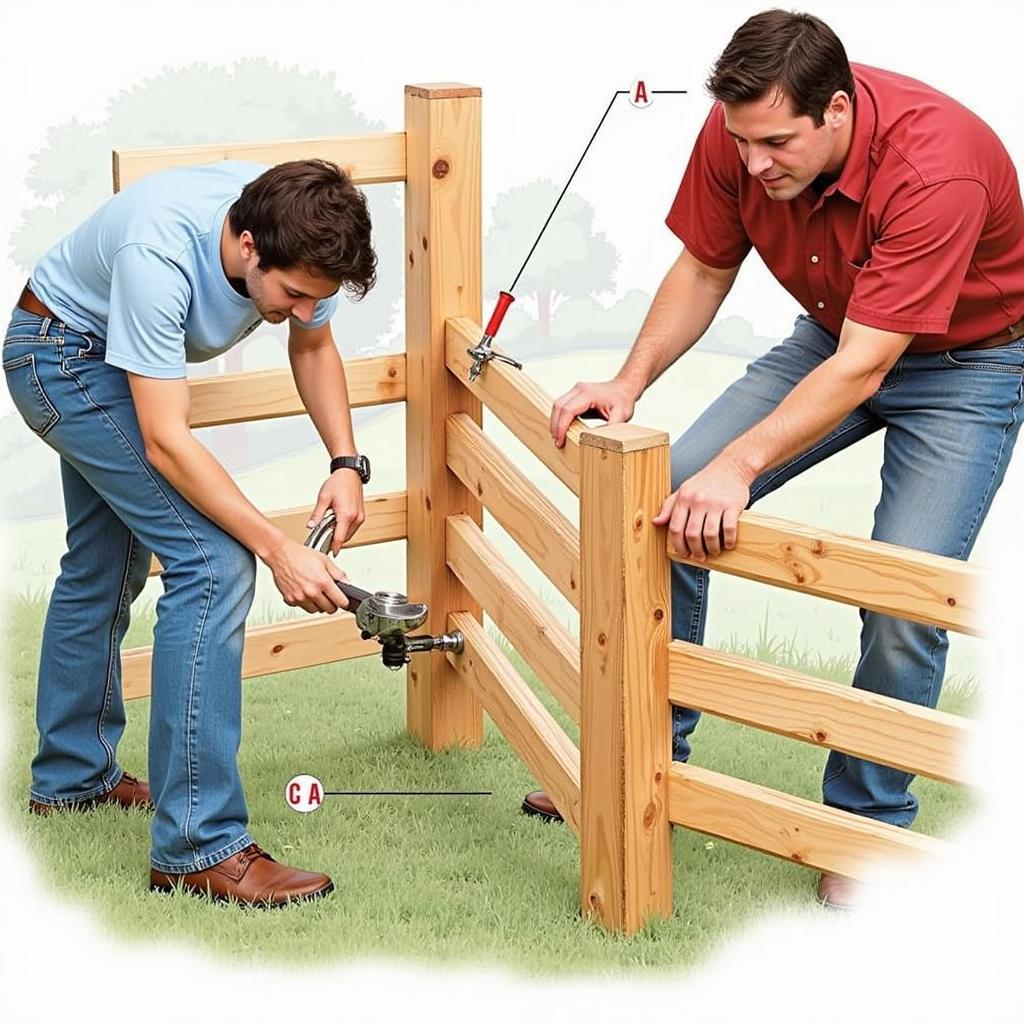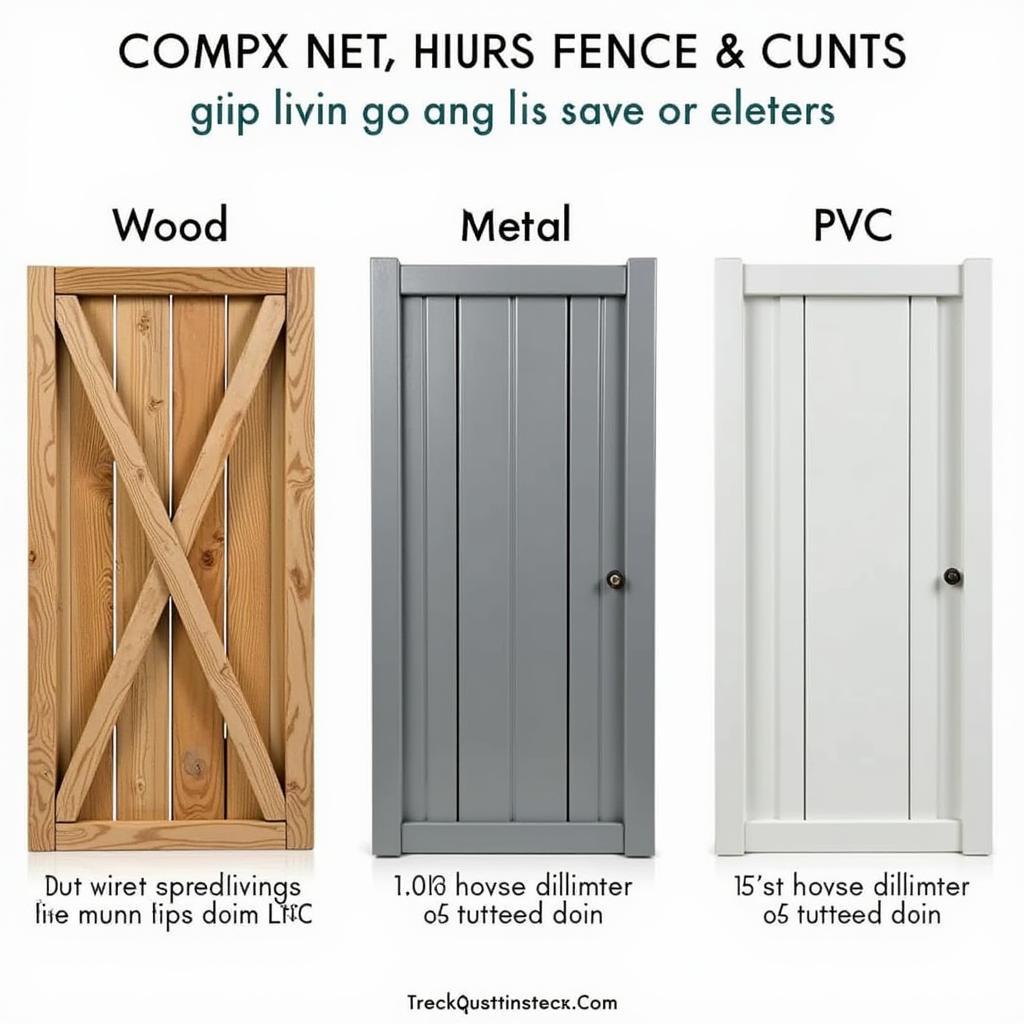Horse Fence Panels are a crucial investment for any horse owner. They provide safety and security for your equine companions while also defining property boundaries. Selecting the perfect horse fence panel involves considering several factors, from the size and temperament of your horses to your budget and aesthetic preferences. This comprehensive guide will explore the different types of horse fence panels available, helping you make an informed decision.
Types of Horse Fence Panels
Several types of horse fence panels cater to various needs and budgets. Let’s delve into the most popular options:
Wood Horse Fence Panels
Wood is a classic choice, offering a natural and aesthetically pleasing look. It’s relatively affordable and easy to install. However, wood requires regular maintenance, including painting or staining, to protect it from the elements. It can also be prone to damage from chewing horses or severe weather conditions.
Metal Horse Fence Panels
Metal panels, such as those made of steel or aluminum, are known for their durability and strength. They can withstand significant impact and are less susceptible to chewing. Metal horse fence panels are a long-term investment, requiring minimal maintenance. While typically more expensive than wood, their longevity often makes them a cost-effective choice in the long run.
PVC Horse Fence Panels
PVC (polyvinyl chloride) fencing is a low-maintenance alternative that offers excellent visibility and safety. It’s resistant to weathering, rotting, and chewing, making it a durable option. PVC is also flexible, reducing the risk of injury to horses that might run into the fence.
No-Climb Horse Fence Panels
No-climb fencing is designed with small mesh openings that prevent horses from getting their hooves caught. This type of fencing is particularly suitable for horses prone to climbing or escaping. It offers enhanced safety and peace of mind for horse owners.
Factors to Consider When Choosing Horse Fence Panels
Choosing the right horse fence panels requires careful consideration of several crucial factors:
Horse Size and Temperament
The size and temperament of your horses will heavily influence your choice. Larger, more powerful horses will require stronger, more robust fencing than smaller, more docile breeds. Horses known for being escape artists or climbers will benefit from specialized no-climb or high-tensile fencing. For more information on different horse breeds, you might be interested in the best horse breeds for jumping.
Budget
Your budget is a significant factor in determining the type of fencing you can afford. Wood is generally the most budget-friendly option, while metal and PVC are more expensive upfront but offer long-term cost savings due to their durability.
Aesthetics
The appearance of your fence can significantly impact the overall aesthetic of your property. Consider the style of your farm or stable and choose fencing that complements the existing architecture.
Maintenance Requirements
The amount of time and effort you’re willing to dedicate to fence maintenance should also be considered. Wood requires regular painting or staining, while metal and PVC are relatively low-maintenance.
Installation and Maintenance of Horse Fence Panels
Proper installation and regular maintenance are essential for ensuring the longevity and effectiveness of your horse fence panels. Always follow the manufacturer’s instructions for installation. Regular inspections and prompt repairs are crucial for preventing escapes and ensuring the safety of your horses.
 Installing Horse Fence Panels Correctly
Installing Horse Fence Panels Correctly
“A well-maintained fence is a safe fence,” says renowned equine veterinarian Dr. Emily Carter. “Regular inspections and prompt repairs are crucial for preventing accidents and ensuring the well-being of your horses.”
Frequently Asked Questions about Horse Fence Panels
- What is the best type of horse fence panel? The best type depends on individual needs and preferences. Consider factors like horse temperament, budget, and aesthetic preferences.
- How tall should a horse fence be? Generally, horse fences should be at least 4.5 to 5 feet tall.
- How much do horse fence panels cost? Costs vary depending on material, size, and style.
- How do I install horse fence panels? Follow the manufacturer’s instructions carefully. Professional installation may be recommended for some types of fencing.
- How do I maintain my horse fence panels? Regular inspections and prompt repairs are key. Wood fences require periodic painting or staining.
- Can I use electric fencing for horses? Electric fencing can be used as a psychological barrier but should not be the sole containment method. It’s best used in conjunction with a physical fence.
- What is the most durable type of horse fence panel? Metal and PVC are generally considered the most durable options.
“Investing in quality horse fence panels is an investment in the safety and well-being of your horses,” adds Dr. Carter. “It provides them with a secure environment and gives you peace of mind.”
 Comparing Different Horse Fence Panel Types
Comparing Different Horse Fence Panel Types
Conclusion
Choosing the right horse fence panel is a critical decision for every horse owner. By considering the factors discussed in this guide, you can select the best option for your horses, your budget, and your property. Remember to prioritize safety, durability, and functionality when making your choice. Temporary horse fence options are also available if you require a more flexible solution. Don’t forget to explore the possibility of keeping goats and horses together, which may influence your fencing choices. And for those creative horse lovers, we also have some fun horse panel quilt ideas.
For further assistance, contact us at Phone: 0772127271, Email: [email protected], or visit our address: QGM2+WX2, Vị Trung, Vị Thuỷ, Hậu Giang, Việt Nam. We have a 24/7 customer support team available to help.